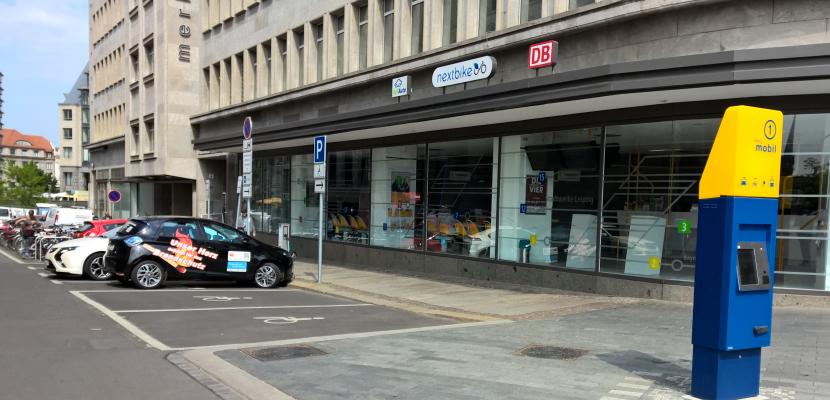
Mobility Stations in Leipzig

About this good practice
Mobility is a basic need for social participation, e.g. for working and shopping. Part of this mobility takes place by car. Cars, however, often cause traffic jams, much CO2e emissions, air pollution and noise, and require space when driving and parking, all more per passenger-km than other modes. Therefore Leipzig strives for modal shift to more sustainable modes, for the electrification of road transport and for the substitution of private by shared cars. Mobility stations will support these changes, as they provide a big variety of mobility options on one spot:
• in most cases (when located close to a tram or bus stop or a train station); access to public transport;
• car sharing, at least one car;
• bike sharing and – at seven locations – also cargo bike sharing;
• e-scooter sharing;
• charging station for e-cars.
In this way the mobility station enables people to travel in more sustainable mobility chains (e.g. bike-public transport, walk-shared e-car). The shared e-car is cleaner than the shared fossil car, and more space efficient and cleaner than the private e-car.
The following companies are involved:
• public transport: Leipziger Verkehrsbetriebe;
• car sharing: teilAuto;
• bike sharing: nextbike;
• cargo bike: nextbike in cooperation with other firms;
• e-scooter-sharing: VOI and TIER;
• charging station: Leipziger Stadtwerke.
The locations for mobility stations are decided by the City of Leipzig. Leipziger Verkehrsbetriebe is the main contractor at each location.
Expert opinion
Resources needed
The sources needed include the spot & an appropriate layout for all functions including
charging lots for e-vehicles (for cars mostly 2, sometimes 4), parking lots for shared cars (at least 1) and a communication and payment column or app.
Equipment & software costs: ca. €10,000/station.
Evidence of success
The first mobility station was opened in August 2015. Since then over 40 mobility stations were opened. The number of car sharing lots has increased from 89 (2015) to 193 (2023), those of e-scooters from 55 (2021) to 83 (2023). The evaluation of the take-up of services is currently in development. For cargo bikes first results are available: in each of the years 2022 and 2023 almost 2500 rental bookings have been registered. All initial partners are still involved and new ones have joined.
Potential for learning or transfer
The policy field of mobility stations (elsewhere also called mobility hubs) is rather new in all Europe, therefore in many ways still experimental. Leipzig found best solutions and needed implementation speeds by conducting studies (as in the “Charging Infrastructure Concept Leipzig 2020”), learning by doing, and by experts and politicians reflecting and drawing conclusions (as currently in the update of the plan and program “Leipzig – City of Smart Mobility”). In the project 2050 CliMobCity Leipzig’s mobility stations served as reference for the other partner cities in terms of:
• types of mobility stations and their locations;
• the technical solutions (e.g. capacity of standards of charging points);
• the organisational framework (e.g. ownership, management, (sub)contracting, tendering).
Leipzig’s mobility stations are suitable to transfer also to other regions or cities, mainly bigger cities.

